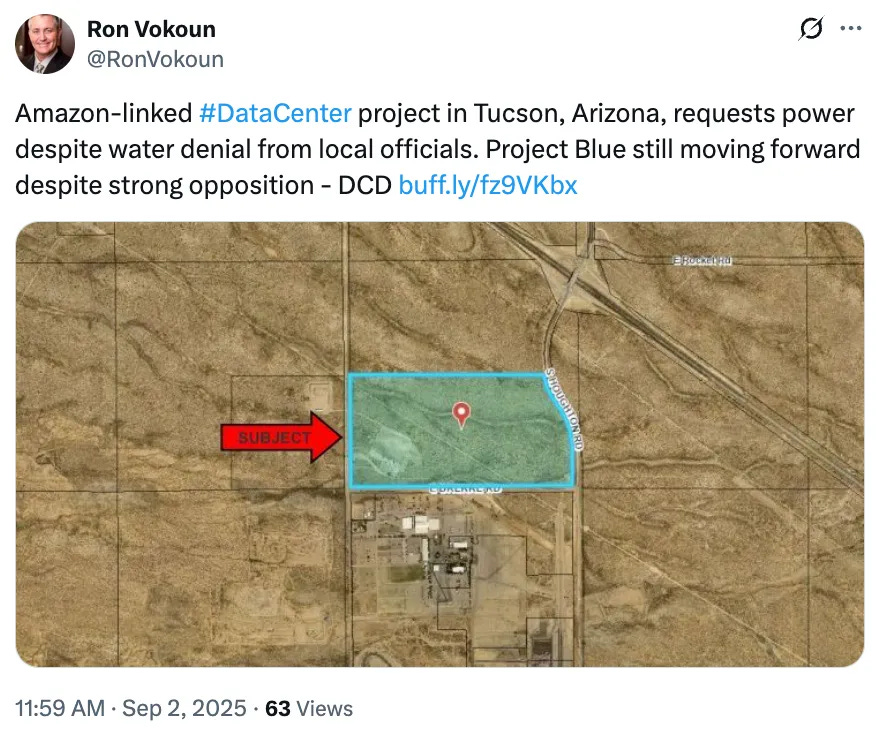Kids in the crosshairs
Guatemalan children spared, for now … Why you looking blue? … And do our jobs, please.
Late Saturday night, federal contractors rolled up to shelters where migrant children from Guatemala were staying, ready to put them on a plane and send them back to Guatemala.
It was the latest move by the Trump administration to widen its mass deportation program. The target this time was roughly 700 Guatemalan children across the country, including 53 in Arizona who are represented by the Florence Immigrant and Refugee Rights Project.
The decision to send the children back to Guatemala set off a whirlwind of legal filings as immigration lawyers raced to stop the deportations.
The arrival of the contractors came with “little to no notice,” the Florence Project’s Deputy Director Roxana Avila-Cimpeanu said in a news release. The Florence Project’s lawyers only had a few hours to stop the deportations, and they worked until 4 a.m. Sunday morning “contacting everyone we could think of” and filing a complaint in federal court in Tucson.
They weren’t the only ones scrambling. Lawyers in Washington D.C. and Illinois hustled to make their cases. The end result was three federal judges, including one in Tucson, telling the Trump administration to hit the brakes.
Judge Sparkle L. Sooknanan in D.C. blocked the deportations for two weeks, and not a moment too soon. Dozens of children were already sitting on planes in Texas when she issued her sternly worded order.
“I don’t want there to be any ambiguity about what I am ordering,” Sooknanan said. “You cannot remove any children” while the case proceeds.
Blowing whistles
The whirlwind started on Friday, when whistleblowers told U.S. Sen. Ron Wyden that Trump officials planned to deport Guatemalan children who crossed the border without a parent.
Wyden, a Democrat from Oregon, sent a letter to federal immigration officials demanding they hold off on the administration’s “push to disappear the vulnerable unaccompanied children” who were entrusted to federal care.
The targeted children were those who didn’t have a parent already living in the U.S., CNN reported Friday.
Generally, unaccompanied minors are released to relatives or sponsors who can take care of them. But in recent weeks, Trump administration officials have put up various obstacles to block the release of the children to sponsors, per CNN.
Most of the children the Florence Project represents are afraid to return to Guatemala, due to abuse or neglect or other reasons, Avila-Cimpeanu wrote.
“None of them have asked the government to send them back and all of them have the right to be heard before an Immigration Judge,” she wrote.
Thousands of unaccompanied minors crossed the U.S.-Mexico border in recent years, but far fewer are doing so now.
Just 67 unaccompanied minors were taken into custody by Border Patrol agents in July along Arizona’s border with Mexico, federal statistics show. That’s an enormous drop from 4,700 in December 2023.
And deporting children is much more difficult than deporting adults. Court rulings and long-standing practice add layers of oversight to make sure children are not sent back to dangerous places.
Who exactly are these kids? The Florence Project lawyers gave several examples in the complaint they filed in federal court in Tucson:
A 12-year-old girl who suffers from chronic kidney disease and relies on dialysis to stay alive. She is seeking asylum and has been at a federal shelter for more than a year. She fears that she will not receive the care she needs in Guatemala.
A pregnant 17-year-old girl. She was forced to work with her father in the fields, which meant she couldn’t finish elementary school. Her father was angry with her when he found out about her pregnancy and likely won’t accept her if she goes home. And she likely won’t have access to medical care for herself or her baby.
A 10-year-old boy and his 3-year-old sister. The boy told his attorney that he does not want to go back to Guatemala, and he does not have family there. He repeatedly expressed happiness that the Florence Project could help him, saying “I have an attorney [who] is going to help me!”
It’s worth noting that the federal judges in D.C. and Tucson blocked the deportations only for two weeks, so you can expect to hear more about this as the case unfolds.
That includes declarations from some of the children who were woken up in the middle of the night on Saturday. One young girl was so scared that she vomited, while a teenager was scared he might end up murdered like one of his family members.
Right now, the main argument from Trump officials and their allies is that it’s actually Democrats who want to separate children from their families in Guatemala, which is a brazen play on the family separations during the first Trump administration that brought a wave of outrage.
As for the parents, Guatemalan officials contacted the families of 115 children who crossed the U.S.-Mexico border without a parent, and 59 of them expressed anger that their children might be returned to Guatemala, Reuters reported Wednesday. Some even described it as intimidation.
“Parents of one girl told Guatemalan authorities ‘that if their daughter returned, they would do everything possible for her to leave the country again, as she is under a death threat,’” Reuters reported.
Meanwhile, Trump officials continue to try to cut funding for pro bono lawyers, including those at the Florence Project, who help migrant children understand their immigration court proceedings.
Curt was in the courtroom back when the first Trump administration started separating families at the border. Good journalism helped sound the alarm and put a stop to it. If you want to keep that type of journalism alive, then consider upgrading to a paid subscription today.
Still feeling blue
Project Sahuarita: While Project Blue’s potential next steps remain something of a mystery, a developer in Sahuarita asked the town council to confirm that his 200-acre property near the Sahuarita landfill could host a data center. The developer, Rancho Sahuarita’s Jeremy Sharpe, told the Green Valley News’ Jorge Encinas that there are no plans to put a data center there now. But the town replied that a data center could move in, providing he can secure a "will-serve statement" from local electric and water utilities stating a data center would not "negatively impact other users or the existing grid," among other requirements.
Contract smontract: Activists want the Pima County Board of Supervisors to un-ink its deal with Project Blue and cancel the sale of the 290 acres of land that it sold to developers for $21 million in July, KGUN’s Craig Smith reports. It’s not clear if supervisors can even do that, but they met with their attorneys behind closed doors for more than three hours on Tuesday about Project Blue. Under the agreement supervisors signed, Beale Infrastructure still has 10 months to close the deal and acquire the land.
You can close the deal and acquire a stake in Tucson’s local news ecosystem by clicking this button today.
Project new utility: The brouhaha over Project Blue and its ongoing scheming with Tucson Electric Power to find a new home shows why Tucson needs its own utility cooperative, Arizona Corporation Commission candidate Derrick Espadas writes in an oped in the Tucson Sentinel. The idea has been gaining steam in recent years as TEP’s franchise agreement, or contract to operate as a monopoly, is coming up for renewal next April.
“Renewing TEP’s exclusive contract would be giving our stamp of approval to everything we’ve just witnessed: backroom deals, silence when we demand answers, loyalty to outsiders over Tucsonans. Enough is enough,” Espadas wrote.
Washes, parks and courthouses
Safety valves: Tucson’s homeless population is dealing with the fallout of the City Council’s decision to criminalize camping in washes, the Arizona Luminaria’s Yana Kunichoff reports. The new crime comes with a potential 10-day jail sentence and $250 charge. But prosecutors aren’t actually pressing for charges against many caught up in the law, including local man Dwayne Moore, who was handcuffed, cited and had his belongings and tent thrown away by police, only to see his charges dropped in court.
“A lot of cases are dispensed with well before they reach the courtroom,” Joel Chorny, a criminal defense attorney in Tucson, told the Luminaria. “That discretion is a very important safety valve in the system.”
Play ball?: Little League parents are complaining that the city’s parks aren’t safe for their kids to play baseball in, saying they’re afraid to let them use the bathrooms because of drugs and violence from the homeless population hanging out there, per AZFamily’s Katherine Patterson. Pima County Attorney Laura Conover told parents to call the police, but they’re slow to react, parents complain.
“My own daughter has come running up to me with needles in hand,” parent Adam Wright said.
UA football and finances
The Name (at) the Game: The University of Arizona is looking to sell the naming rights to its football stadium, currently known as Arizona Stadium, Jason Barr reports for KGUN. Potential deals for the stadium have not coincided with the start of football season. The name switch would be similar to that at Arizona State University, which has a more than $50 million deal with Mountain America Stadium over 15 years for the naming rights to the stadium previously called Sun Devil Stadium. A deal could help further stabilize the previous $39 million dollar annual budget deficit that Arizona Athletic Director Desiree Reed-Francois says she inherited.
"I'd love to tell you that we'll have it done in two weeks," Reed-Francois said. "It could be 18 moths. There are a lot of conversations and a lot of analytics that go into that.”
In other other news…
Cochise County Supervisor Tom Crosby added a claim of malpractice against former County Attorney Brian McIntyre to his lawsuit against the county seeking $300,000 to cover his legal costs for being charged with felony election interference for refusing to certify the results of the 2022 election in Cochise County, per the Herald-Review … Border crossing data shows slight decreases in the first seven months of the year, per the Nogales International, potentially because of a weakened Mexican peso, higher costs for U.S. goods due to tariffs, lengthy wait times at the port, and fear of losing U.S. visas ... The Hermosa Mine shared renderings of Centro — its future 24-hour remote operations center in Nogales, according to the Daily Star… And the Daily Star’s Tim Steller spoke with Secretary of State Adrian Fontes about his fear that Trump is planning to cancel the 2026 elections, outlining Fontes’ five reasons he thinks the threat is real.
The internet is usually full of junk that makes us chuckle.
But on slower news days, the “What We’re Laughing At” portion of this email can be a real head-scratcher.
So today, we’re opening the floor to you, dear reader.
What are you laughing at?
It can be an innocent chuckle, a schadenfreude-laced cackle, a laugh-so-you-don’t-cry. Whatever! Only rule is it has to be tangentially related to Southern Arizona.
The comments are open to all readers. Drop us a link, or write up the whole item! We might include it in tomorrow’s edition.






Regarding Kids In The Cross hairs: excellent journalism. Thank you. Sadly, no one can expect due process for migrants, refugees and asylum seekers from a president who has said that he is the law.
Maybe not a laugh but a shake of the head in disbelief at the $77 million cost...In case you wanted to know how many days the prez plays golf, this lil site tracks the days he plays golf. DID TRUMP GOLF TODAY
https://didtrumpgolftoday.com/